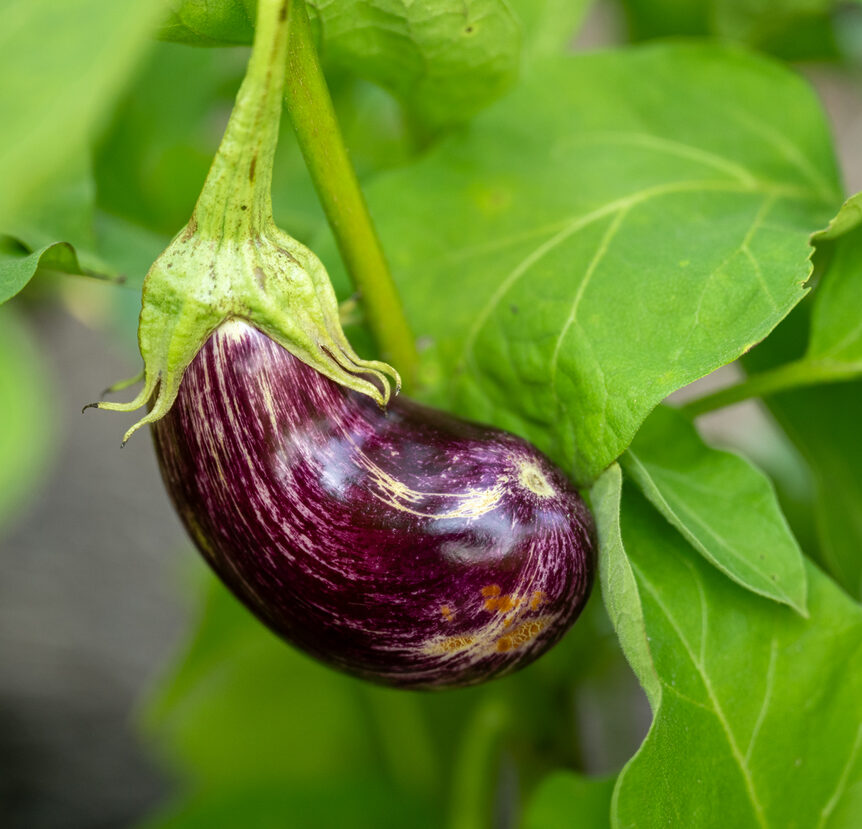Flea beetles are tough to control because they have a complex digestive system, protective exoskeletons, high mobility, and limited predators. Their complex digestive system means they can eat holes directly through the leaf, and chew up the whole thing. Plants don’t develop beetle resistance until the final level of the Plant Health Pyramid.
We often encounter the worst flea beetle problems on spring eggplant and very young brassicas, like arugula or kale, but beetles can survive on a greater variety of food sources than other insects. Plants to which beetles are particularly attracted—like baby brassicas—need to be at a very high level of health in order to repel them.
Getting plants this healthy can be quite difficult in early spring when they’re young, tender, and their nutrients haven’t stabilized yet. We often need to stack multiple plant health-boosting techniques to achieve maximal control.
Here are a number of techniques that can help get there:
- The best way we know to get a healthy young plant right out of the gate is by using our Regenerative Soil Primer before planting.
We’ve witnessed a beautiful eggplant crop that was effectively flea beetle-free, with gorgeous plants. It had received Soil Primer in both fall and spring. Across the road, a neighboring grower’s eggplant crop, which had not received Soil Primer, was covered in flea beetles.
- Using BioCoat Gold when seeding gets roots collaborating with beneficial mycorrhizae right from their first moment of emergence.
- We recommend applying a nutritional solution when transplanting, and also applying foliars early on, to beef up a young plant as quickly as possible. Foliars applied to seedlings when they’re still tightly packed in trays can be incredibly economical and quick to apply. Here are simple recipes for those applications:
Transplant solution:
| Product | Rate per acre | Rate per 1000 ft2 |
| MacroPak | 4 qt | 3 oz |
| Rejuvenate | 4 qt | 3 oz |
| SeaStim | 2 qt | 1.5 oz |
| BioCoat Gold* | 25 g | 1/8 tsp |
* It is important to stir this continuously because BioCoat Gold does not mix well with water and so has a strong tendency to fall out of solution.
Seedling Foliar:
| Product | Rate per acre | Rate per 1000 ft2 |
| MacroPak | 2 qt | 1.5 oz |
| MicroPak | 1 qt | 1 oz |
| SeaStim | 1 qt | 1 oz |
| Micro 5000 Organic | 25 g | 1 gram |
- Row cover, while not perfect, can help keep beetle pressure down while plants get established.
- Sacrificial plants, weaker greens, or other “catch” crops that flea beetles are attracted to, can keep the beetles off your high value crops for long enough to get them established.
- Make sure to seek out high-quality seed; it makes a difference in very early season plant performance. With any seed, but certainly seed of uncertain quality, SeedFlare can supply mineral nutrition that the seed needs but is lacking.
- Some growers use discretionary but well-timed organic insecticides. That’s not ideal, but if it keeps the flea beetles off long enough to allow the plant to reach level 4 of the Plant Health Pyramid, then it can be an effective step.
By piling on a suite of solutions, you can help your plants survive the spring onslaught of flea beetles. This early vigor will pay off manyfold down the road: plants that get off to a great start will continue resisting stressors throughout the season, and lead to a great harvest later on.
Get 10% off now when you bundle BioCoat Gold with all 3 Soil Primer products: Rejuvenate, SeaShield, and Spectrum.
Sale ends 4/30/25.
Subscribe to get each post right to your inbox.
You'll get each post to your inbox (~1x/week).
You may unsubscribe at any time. We value your personal information. Here's our Privacy Policy.
"*" indicates required fields


